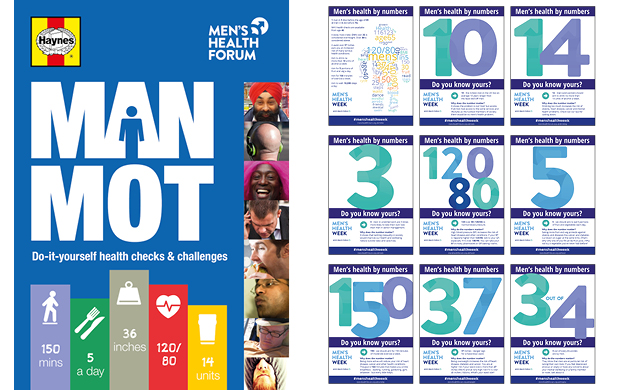How many goals has Harry Kane scored this season? How many Grand Prix has Lewis Hamilton won? How fast is the new iphone?*
Men are supposedly obsessed with numbers but when it comes to our own health, there are quite a few we don’t know. Men’s Health Week 2019 takes up that challenge.
So the first number we need to know is 10: Men’s Health Week begins on 10th June and ends the 16th.
The Men’s Health Forum are raising awareness of:
- 7 numbers that all men need to know and
- 5 statistics that policy-makers and service-providers need to know if they're to reach men effectively.
For men who want to get to know their numbers better, the Forum is also publishing Man MOT, a new interactive manual that enables men to check their own health and then challenges them to do better. Man MOT has 25 health challenges in total.
New manualFree QuizFree Posters
Key numbers for men:
- 37 - a waist size of 37 inches or above puts you at increased of heart disease, diabetes and cancer. Learn more.
- 150 - men should aim for 150 minutes of moderate physical activity a week. Learn more.
- 5 - we should aim to eat 5 portions of fruit and veg a day. Learn more.
- 14 - maximum 14 units of alcohol a week. Learn more.
- 10 - cigarette smokers die 10 years younger on average than non-smokers. Learn more.
- 120/80 - normal blood pressure. Learn more.
- 75 - 75% of suicides (3 out of 4) are by men. Learn more.
Key numbers for policy-makers and service providers:
- 1 man in 5 dies before the age of 65
- 2 men in 5 die before the age of 75
- 3 out of 4 suicides are by men
- Men in unskilled work are 3 times more likely to take their own lives than men in senior management
- The richest men live on average 10 years longer than the least well-off men. Richer area = longer life. How does your local authority do?
- More stats
Our message:
One man in five dies before he is old enough to retire. Together, by knowing our numbers, we can change this statistic.
Martin Tod, Chief Executive of the Men’s Health Forum said:
Whether it's targets for treatments or percentages of patients, health care is drowning in numbers. Which ones really matter?
For Men's Health Week 2019, the Men’s Health Forum has pulled out the key numbers. We have seven numbers we want all men to know and five statistics we want everyone working in health care to know including the male life-expectancy gap in their area.
At the Men's Health Forum, men of all ages, policy-makers and service-providers alike all ask what they can do to improve men's health. Knowing a few simple numbers can make all the difference.
To take it further, our new interactive manual 'Man MOT- DIY checks and challenges' helps men put those numbers to work monitoring their own health and living healthier lives.
> Get the man manual
Man MOT is a new interactive manual built around knowing your numbers, that enables men to check their own health and then challenges them to do better. Easy to use - 25 health challenges in total.
> Free Men's Health By Numbers quiz
12 key questions about men's health - the perfect way to learn the key numbers. Great fun in groups or test yourself. East to use PDF slideshow.
> Download the posters
We have posters highlighting various themes for the week available FREE to download in our shop
Share the hashtags:
In all your social media use the hashtags…
#menshealthweek #menshealthbynumbers
* At the time of writing, Harry Kane had scored 27 goals in the 2018-19 season, Lewis Hamilton had won 76 Grand Prix and the latest iPhone A12 Bionic processor was supposedly 13% faster.

